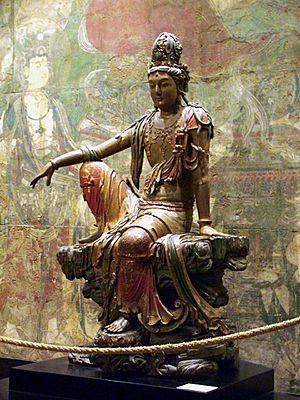Compassion facts for kids

Compassion means caring about the suffering of others. It's a feeling that makes you want to help someone who is having a hard time.
When you feel compassion, you not only notice someone's pain, but you also feel a desire to make things better for them. It's different from sympathy, which is more about feeling sorry for someone. Compassion adds warmth and a wish to act. Experts say compassion has three parts: noticing, feeling, and responding to suffering.
Contents
Compassion in Medicine
Compassion is a very important quality for doctors and other healthcare workers. It helps them understand what patients are going through. When doctors are compassionate, they want to do everything they can to help their patients feel better.
This feeling motivates doctors to put their patients' needs first. It helps them make sure they don't cause harm, provide the best care, and keep patient information private. Compassionate doctors understand how illness and pain affect people. This helps them treat not just the sickness, but also the person dealing with it.
Compassion in Religions and Philosophy
Many religions and philosophies teach that compassion is a key virtue. It's often seen as a way to connect with others and live a good life.
Christianity

In Christianity, God is often described as full of mercy and comfort. The Bible talks about how God comforts people in their troubles, so they can then comfort others.
Blessed be the God and Father of our Lord Jesus Christ, the Father of mercies and God of all comfort, who comforts us in all our affliction so that we will be able to comfort those who are in any affliction with the comfort with which we ourselves are comforted by God.
Jesus showed great compassion to everyone, especially those who were struggling or outcast. He taught his followers to put aside their own desires and help others.
One famous story Jesus told is the Parable of the Good Samaritan (Luke 10:29–37). In this story, a traveler from Samaria felt deep compassion for a man who had been beaten and left by the road. He stopped to help him, even though Samaritans and others were not usually friendly.
Islam

In Islam, two of God's most important names are "the Compassionate" (Rahman) and "the Merciful" (Rahim). Almost every chapter of the Quran begins with the phrase, "In the name of Allah the Compassionate, the Merciful."
Certainly a Messenger has come to you from among yourselves; grievous to him is your falling into distress, excessively solicitous respecting you; to the believers (he is) compassionate.
The Arabic word for compassion is rahmah. Muslims are encouraged to start each day, prayer, and important action by saying, "Bism-i-llah a-Rahman-i-Rahim" (In the name of Allah, the Most Compassionate, the Most Merciful). Even family ties are seen as being connected to Allah's compassion.
Indian Religions
Buddhism

In Buddhism, understanding suffering is key to developing compassion. When people realize that suffering exists and that it's possible to be free from it, they begin to feel compassion for others who are also suffering.
The 14th Dalai Lama, a spiritual leader in Buddhism, once said, "If you want others to be happy, practice compassion. If you want to be happy, practice compassion." This shows how important compassion is for both personal and shared happiness.
Hinduism

In Hinduism, compassion is a very important virtue. There are several Sanskrit words that describe different aspects of compassion. Some common ones are daya (दया), karuṇā (करुणा), and anukampā (अनुकम्पā).
Many Hindu thinkers, like Mahatma Gandhi, believed that showing compassion to all living beings is a central idea in Hindu philosophy.
Daya is described as the good desire to lessen the sadness and difficulties of others, by doing whatever is needed to help. Another text, the Matsya Purana, says that daya means treating all living things as if they were part of yourself, wanting what is good for them. This kind of compassion is seen as a path to happiness.
Related pages
 In Spanish: Compasión para niños
In Spanish: Compasión para niños
 | Victor J. Glover |
 | Yvonne Cagle |
 | Jeanette Epps |
 | Bernard A. Harris Jr. |

